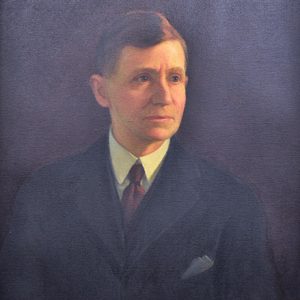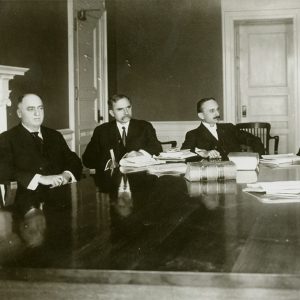calsfoundation@cals.org
Jesse Cleveland Hart (1864–1933)
Jesse Cleveland Hart was appointed associate justice to the Arkansas Supreme Court in 1907 after the death of Justice James E. Riddick, who died of typhoid fever on October 9, 1907, while in office. Hart served as an associate justice until 1927, when he was appointed chief justice following the resignation of Chief Justice Edgar A. McCulloch. Hart served as chief justice until his death in 1933.
Jesse C. Hart was born in a two-story log home near Dardanelle (Yell County) on July 25, 1864. Hart was the second of seven children of James E. Hart, who was a physician, and Sarah Stone, both pioneers of Yell County. His mother, a talented and educated woman whose own father was a graduate of Yale University, stressed the importance of an education to her children. Hart was a direct descendent of John Hart of New Jersey, who was a delegate to the Continental Congress and signed the Declaration of Independence.
Hart was a member of the Presbyterian church in Dardanelle, and the first school he attended was Dobson Springs, a one-room log schoolhouse near Dardanelle. He attended the University of Arkansas (then known as Arkansas Industrial University) in Fayetteville (Washington County) and graduated with an AB degree in June 1885. Hart wanted to study medicine, but his father insisted that he take up law because his older brother, Dogan Hart, had chosen the medical profession.
Hart began his legal studies in Ann Arbor, Michigan, at the University of Michigan Law School but left after a short period of time. He told his father that he wanted to leave Michigan because he did not want to attend classes with African-American students. His father agreed and arranged for him to transfer to Vanderbilt University in Nashville, Tennessee. Hart graduated from there with an LLB degree in 1890 and then moved back to Arkansas to study law in the office of Colonel Marcellus L. Davis and Judge Bob Bullock in Dardanelle. After he was admitted to the bar, the firm changed its name from Davis and Bullock to Davis, Bullock and Hart.
On September 7, 1897, Hart married his childhood sweetheart, Lillie Jacoway, in their hometown of Dardanelle. A schoolteacher, she was the daughter of Judge W. D. Jacoway, who was judge of the Fifth Judicial District. The couple had one daughter, Ethel Hart.
Hart made two unsuccessful races for prosecuting attorney of the Fifth Judicial District. In 1900, he was hired to work in the Rock Island Railroad’s legal department, where he handled right-of-way matters and condemnation suits. Hart’s work spanned from Memphis, Tennessee, to the Oklahoma state line, so he moved to Little Rock (Pulaski County), a more central location.
In January 1903, he was appointed chancellor of the First Chancery District by Governor Jeff Davis to succeed Thomas B. Martin. Hart served in this position until he was appointed associate justice in October 1907 by Governor Xenophon Overton Pindall. Hart was reelected several times to this position until he was appointed chief justice in 1927.
As a judge, Hart believed strongly in the idea that “justice delayed is justice denied.” He reportedly worked late into most evenings and was always painstakingly prepared. His opinions were short and well-constructed, clearly stating the issue and citing applicable authorities to support his conclusions. He often cited cases that had not been found by either side and chastised attorneys if their cases were poorly briefed, as he felt their lack of preparation greatly increased the workload of the court. His work ethic was cited as a model for other judges to follow.
He was a scholar when it came to constitutional law, both federal and state. He was said to have a profound knowledge of the Arkansas Constitution of 1874 and the decisions construing its provisions. He was drawn to equity jurisprudence, which was probably due to his service as chancellor, and his strongest and best opinions were in these fields.
One important case he handled was Road Improvement District v. Glover. In its decision, in which Judge Hart concurred, the court held that the Arkansas General Assembly could, through a valid act, authorize the organization of part of a county into a road district for the purpose of repairing and maintaining public roads in the district. However, such a district could not be formed or authorized to establish new public roads and impose upon the county the responsibility to maintain them. This decision showed that the constitutional power of the legislature had limitations.
On September 15, 1932, Hart entered the Arkansas Tuberculosis Sanatorium in Booneville (Logan County). Efforts to restore his health failed, and Hart died of tuberculosis on March 6, 1933. His burial place is unknown.
For additional information:
Memorial Exercises on the Death of Chief Justice Jesse C. Hart. Arkansas Supreme Court Library, Little Rock, Arkansas.
Stevenson, C. R. Arkansas Territory—State and its Highest Courts. Little Rock: Clerk of the Supreme Court, 1946.
Marty E. Sullivan
Little Rock, Arkansas








Comments
No comments on this entry yet.